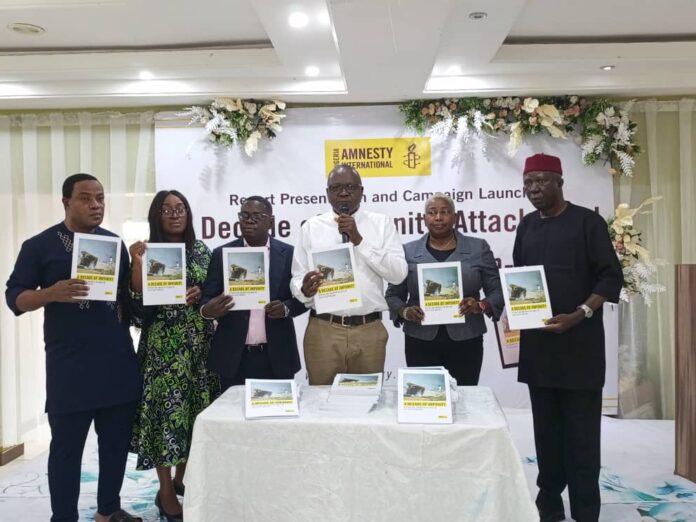A poorly-managed security situation in Southeast Nigeria, which unleashed a free-for-all reign of impunity in which numerous state and non-state actors committed serious human rights violations, resulted in the killing of at least 1,844 people between January 2021 and June 2023.
This is according to a report by a human rights organization, Amnesty International, Nigeria, presented on Tuesday, in Enugu, Southeast Nigeria.
The report titled ‘A decade of impunity: Attacks and unlawful killings in Southeast Nigeria’, documented unlawful killings, torture, forced disappearances and arbitrary arrests at the hands of rampaging gunmen, state-backed paramilitary outfits, vigilantes, criminal gangs and cult groups in the Southeast region.
The presentation attracted key stakeholders from all 5 states of the Southeast, including the civil society, women and youth groups, families and communities of victims of insecurity and violence, the media and other relevant groups.
In an overview of key findings from the report, the Director, Amnesty Nigeria, AI Nigeria, Isa Sanusi said the report was based on interviews with 100 people, including survivors, victims’ relatives, civil society members, lawyers, and traditional and religious leaders.
He also revealed that the organization carried out research missions to Owerri in Imo state, Asaba in Delta State, Obosi in Anambra state, and Enugu in Enugu state, between April 2023 and November 2023.
According to him, the report underscores the roles of secessionist groups, armed groups, security agencies and state-backed paramilitary groups in turning the once-peaceful and economically viable region into a place of bloodshed, rights violation, and economic loss.
Noting that the report also provides the authorities with adequate leads to open an investigation that will end the impunity and provide victims with justice, the AI Nigeria director said every family or victim of the violence deserves justice and accountability, and it is an obligation for the Nigerian government to protect lives, whether in the city or the hinterlands.
“Amnesty International is saying that the Nigerian government must begin to take action against forced disappearances, killings, torture, and assassinations by state and non-state actors.
“Insecurity in the southeast has affected people’s rights, including the rights to life, physical integrity, security, liberty and freedom of movement. Many people have not traveled to their hometowns for several years for fear of attack or abduction. Schools shut, markets closed with harsh economic implications for communities.
“The Nigerian authorities must uphold their constitutional and international human rights obligations by guaranteeing, protecting and ensuring the rights to life, physical integrity, and liberty, safety and security of the people and stemming the tide of rampant insecurity in the Southeast region.
“Authorities must undertake prompt, thorough, independent, impartial, transparent and effective investigations into all allegations of violations and abuses committed by state and non-state actors,” he said.
Earlier, an AI Nigeria Board member, Ler Jonathan-Ichaver said the report presentation signals the organization’s commitment to mobilizing Southeast stakeholders to begin to demand accountability from government and other players, as it concerns insecurity in the region.
She said the organization is launching at the back of the report, a global campaign to draw the world’s attention to the killings in the Southeast, and to drive action for change to end the cycle of violence.
“This will be a call on all stakeholders to use their contacts within and outside Nigeria to support the efforts to put an end to these atrocities.
“We have over 10 million voices across the globe backing us, and today signals again, our commitment to leading this charge collectively, as advocates for justice and a better future for ourselves and the coming generations,” she noted.
In a presentation on the research methodology adopted for the research, a staff of AI Nigeria, Maurice Chukwu expressed worry that of all the five Southeast governors, who the organization sought a meeting with to discuss the violence in the region, only that of Anambra State responded and committed to meet with the organization.
A relative of one of the victims of the killings, Nduka Ozor, from Agwa community in Imo state shared gory experiences of how his brother, a legal practitioner, was brutally murdered by known gunmen within their area, calling for justice for his brother and others who faced a similar ordeal.
Some panelists at the report presentation including the executive director the Rule of Law and Accountability Advocacy Centre, RULAAC, Okechukwu Nwanguma and a professor of International Relations and Strategic Studies at the Enugu State University of Science and Technology, Felix Asogwa commended the report’s comprehensiveness and said the Amnesty International did a very good job in highlighting the teething challenges driving insecurity and killings in the region.
According to Nwanguma, “the report is a very important intervention on the problem of impunity, which is driving the problem of insecurity in the southeast. It also validates what RULAAC and other CSOs have documented in trying to identify impunity.
“It is a call to conscience, showing clearly that without accountability, peace will remain elusive. People in the southeast are trapped between criminal forces and abusive security forces, whose highhandedness is driving the problem. It is worrisome that security forces respond to security matters in a way that they themselves constitute insecurity.
“Recalled how a former IGP in Enugu, ordered police operatives to go after secessionist groups and kill them and not worry about what will happen. These are the issues and until we begin to demand accountability for these reckless actions, nothing will change,” he said.
Another panelist and civil society activist, Nelson Nwafor faulted the culture of silence by the southeast stakeholders and governors over the killings in the region, stressing the need to use the report to engage security agencies, the state and non-state actors so that an end can come to the anomaly.



